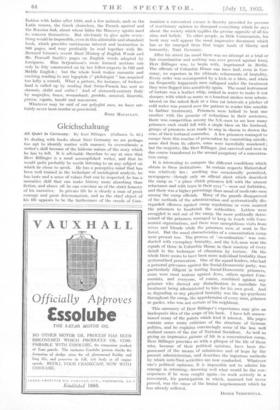Gleichschaltung
All Quiet in Germany. By Karl Billinger. (Gollancz. 7a. 6d.) IN dealing with books about Nazi Germany we ere perhaps too apt to identify matter with manner, to overestimate a writer's skill because of the hideous nature of the story which he has to tell. It is advisable therefore to say at once that Herr Billinger is a most accomplished writer, and that he would quite probably be worth listening to on any subject on which he chose to speak. He has a perceptive mind that has been well trained in the technique of sociological analysis, he has taste and a sense of values that can be respected, he has a narrative skill that can make history more absorbing than fiction, and above all he can convince us of the strict honesty of his narrative. In private life he is clearly a man of great courage and great determination, and as the chief object of his life appears to be the furtherance of the creeds of Corn-
munism a convenient excuse is thereby provided for persons of reactionary opinion to disregard everything which he says about the society which typifies the.precise opposite of all his aims and beliefs. To other people, as little Communists, his book may well appear the most impressive document which has so far emerged from that tragic tomb of liberty and humanity, Nazi Germany.
After his arrest (as usual there was no attempt at a trial or fair examination and nothing was ever proved against him), Herr Billinger was, to begin with, imprisoned in Berlin. The officials of Columbia .House can have had, even in Gerr. many, no superiors in the ultimate refinements of brutality. Every order was accompanied by a kick or a blow, and when (as frequently happened) men collapsed under the treatment they were flogged into sensitivity again. The usual instrument of torture was a leather whip, soaked in water to make it cut sharper, with which as many as a hundred strokes were admin- istered on the naked flesh at a time (at intervals a pitcher of cold water was poured over the patient to render him sensible to further treatment). Prisoners were bribed to beat one another with the promise of reductions in their sentences, there was competition among the S.S.-men to see how many prisoners each could fell with a single blow on the forehead, groups of prisoners were made to sing in chorus to drown the cries of their tortured comrades. A few prisoners managed to escape from this routine of persecution by committing suicide, some died from its effects, some were mercifully murdered ; but the majority, like Herr Billinger, just survived and were in due course transferred to the second purgatory of a concentra- tion camp.
It is interesting to compare the different conditions which obtain in these institutions. In certain respects Hubertshof was relatively lax : smoking was occasionally permitted, newspapers—though only an official sheet which described the camp as " a place which prisoners left with the utmost reluctance and with tears in their eyes "—were not forbidden, and there was a higher percentage than usual of moderate men among the camp officials. Many of the guards disapproved of the methods of the administration and systematically dis- regarded offences against camp regulations or even assisted the prisoners to hoodwink the authorities. Letters were smuggled in and out of the camp, the more politically deter- mined of the prisoners managed to keep in touch with Com- munist organizations, and there were surreptitious visits from wives and friends while the prisoners were at work in the forest. But the usual characteristics of a concentration camp were present too. The process of ' co-ordination ' was con-. ducted with exemplary brutality, and the S.S.-men were the equals of those in Columbia House in their mastery of every detail in the technique of education by torture. On the whole there seems to have been more individual brutality than systematized persecution. One of the squad-leaders, who had a personal grievance against the Social-Democratic party, was particularly diligent in baiting Social-Democratic prisoners, some were most zealous against Jews, others against Com- munists, and everyone, ofcourse,com btoinedassaimga against any
the
prisoner who showed any disinclination
treatment being administered to him for his own good. And. as degrading as any physical brutality was the spy-psychosis throughout the camp, the apprehension of every man, prisoner or gaoler, who was not certain of his neighbour.
This summary of Herr Banger's experiences may give an inadequate idea of the scope of his book. I have left unmen- tioned many of the points which lend it interest. His pages contain some acute criticism of the structure of German politics, and he explains convincingly some of the less well realized causes of the rise of National Socialism. As well as giving an impressive picture of life in a concentration camp, Herr Billinger provides us with a glimpse of the life of those who, because of their political opinions, have been dis- possessed of the means of subsistence and of hope by the present administration, and describes the ingenious methods by which anti-Nazi activities are now conducted. Whatever one's political opinions, it is impossible not to admire his courage in returning—knowing well what would be the con- sequences if he were caught again--to work actively in a. movement, his participation in which, assumed but never proved, was the cause of the brutal imprisonment which he has already suffered.
DEREK VERSCKOYLE.










































 Previous page
Previous page